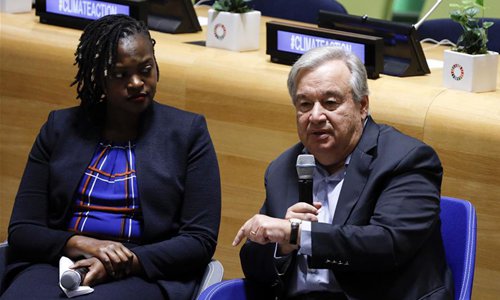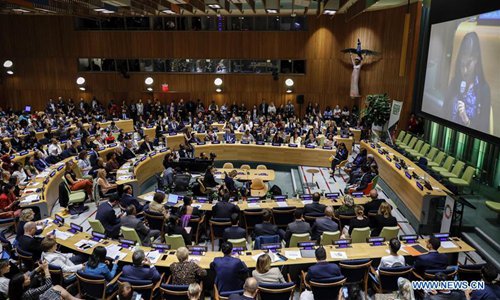HOME >> WORLD
UN chief sees change in momentum of climate action thanks to youth movement
Source:Xinhua Published: 2019/9/22 10:43:48

United Nations Secretary-General Antonio Guterres (R) speaks during the UN Youth Climate Summit at the UN headquarters in New York, Sept. 21, 2019. UN Secretary-General Antonio Guterres on Saturday said he saw a change in the momentum of global climate action thanks to the ongoing youth movement. (Xinhua/Li Muzi)
UN Secretary-General Antonio Guterres on Saturday said he saw a change in the momentum of global climate action thanks to the ongoing youth movement.
"When I started two years and something ago (as UN secretary-general), I must say I felt very, very discouraged in relation to the prospects of climate action. ... All of a sudden, I started to feel that there was momentum that was gaining," said Guterres in an interaction with young climate activists at the first-ever Youth Climate Summit.
"This (change) was largely due to the youth movement that started a fantastic, very dynamic impulse around the world, moving progressively with them, their families, their communities, their societies, and based on the societies moving, and the voice of the societies being heard, starting to have an impact on the way businesses were acting, on the way cities were acting, and on the way regions were acting."
"Finally, we are starting to see electorates being active on these and governments starting to respond," he said.
Guterres asked young climate activists to keep on their work and to maintain the pressure for world leaders to act.
"I encourage you to go on, I encourage you to keep your initiative, keep your mobilization, and more and more to hold my generation accountable. My generation has largely failed until now to preserve both justice in the world and to preserve the planet."
"I have granddaughters. I want my granddaughters to live in a liveable planet. My generation has a huge responsibility. It is your generation that must make us accountable to make sure that we don't betray the future of humankind," he said with emotion.
Guterres, who attended the Youth Climate Summit as the "keynote listener," asked world leaders to listen.
"I have been more times a keynote speaker than a listener. That is one of the problems of world leaders: they talk too much and they listen too little."
"It is in listening that we learn. It is in giving the possibility for all those that represent today's world to speak and to have their voices be part of decision-making processes that we can move forward."

Photo taken on Sept. 21, 2019 shows the United Nations Youth Climate Summit held at the UN headquarters in New York, Sept. 21, 2019. UN Secretary-General Antonio Guterres on Saturday said he saw a change in the momentum of global climate action thanks to the ongoing youth movement. (Xinhua/Li Muzi)
Guterres saw global warming as a game-changer. "We have had conflicts among people for centuries or for millennia since the human race existed. But, for the first time, there is a serious conflict between people and nature, between people and the planet."
This situation could be absolutely destructive for the future of communities and for the future of all societies, he warned.
It's not only a question of glaciers or ice caps, or corals, even if biodiversity is a vital question in today's world. But it is more and more about the suffering of people. And this will become worse and worse as time goes by. Lots of people are today dramatically dying and suffering because of the impacts of climate change, he said.
It does not make sense to go on subsidizing fossil fuels. Some people present the subsidies of fossil fuels as a benefit to the population. No, they are done with taxpayers money. It doesn't make sense to put money to boost hurricanes, or to bleach corals or to destroy communities, said Guterres.
He argued that, on the other hand, tax on carbon can be used to help solve the problems of unemployment.
A win-win strategy is possible if climate action is combined with a fair globalization, in which the resources can be better distributed and better used, he said.
"We do not live in a fair globalization. The dramatic thing is, it's not the African continent, or the small islands in the Pacific or the Caribbean, that contribute more to climate change, but they are the main victims. It's not the poorest communities that contribute more to climate change, but they are the main victims."
"We need to link climate change to a new model of development, a model with more justice among people, and a fair relation between people and the planet."
RELATED ARTICLES:
Posted in: EUROPE,WORLD FOCUS